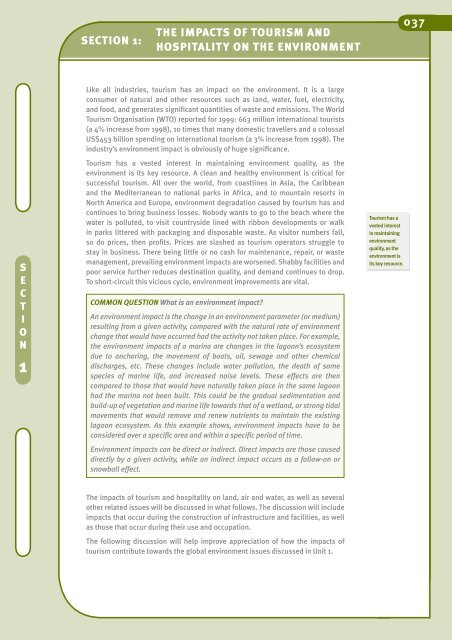Online version: PDF - DTIE
Online version: PDF - DTIE
Online version: PDF - DTIE
Create successful ePaper yourself
Turn your PDF publications into a flip-book with our unique Google optimized e-Paper software.
SECTION 1:<br />
THE IMPACTS OF TOURISM AND<br />
HOSPITALITY ON THE ENVIRONMENT<br />
037<br />
S<br />
E<br />
C<br />
T<br />
I<br />
O<br />
N<br />
1<br />
Like all industries, tourism has an impact on the environment. It is a large<br />
consumer of natural and other resources such as land, water, fuel, electricity,<br />
and food, and generates significant quantities of waste and emissions. The World<br />
Tourism Organisation (WTO) reported for 1999: 663 million international tourists<br />
(a 4% increase from 1998), 10 times that many domestic travellers and a colossal<br />
US$453 billion spending on international tourism (a 3% increase from 1998). The<br />
industry’s environment impact is obviously of huge significance.<br />
Tourism has a vested interest in maintaining environment quality, as the<br />
environment is its key resource. A clean and healthy environment is critical for<br />
successful tourism. All over the world, from coastlines in Asia, the Caribbean<br />
and the Mediterranean to national parks in Africa, and to mountain resorts in<br />
North America and Europe, environment degradation caused by tourism has and<br />
continues to bring business losses. Nobody wants to go to the beach where the<br />
water is polluted, to visit countryside lined with ribbon developments or walk<br />
in parks littered with packaging and disposable waste. As visitor numbers fall,<br />
so do prices, then profits. Prices are slashed as tourism operators struggle to<br />
stay in business. There being little or no cash for maintenance, repair, or waste<br />
management, prevailing environment impacts are worsened. Shabby facilities and<br />
poor service further reduces destination quality, and demand continues to drop.<br />
To short-circuit this vicious cycle, environment improvements are vital.<br />
COMMON QUESTION What is an environment impact?<br />
An environment impact is the change in an environment parameter (or medium)<br />
resulting from a given activity, compared with the natural rate of environment<br />
change that would have occurred had the activity not taken place. For example,<br />
the environment impacts of a marina are changes in the lagoon’s ecosystem<br />
due to anchoring, the movement of boats, oil, sewage and other chemical<br />
discharges, etc. These changes include water pollution, the death of some<br />
species of marine life, and increased noise levels. These effects are then<br />
compared to those that would have naturally taken place in the same lagoon<br />
had the marina not been built. This could be the gradual sedimentation and<br />
build-up of vegetation and marine life towards that of a wetland, or strong tidal<br />
movements that would remove and renew nutrients to maintain the existing<br />
lagoon ecosystem. As this example shows, environment impacts have to be<br />
considered over a specific area and within a specific period of time.<br />
Environment impacts can be direct or indirect. Direct impacts are those caused<br />
directly by a given activity, while an indirect impact occurs as a follow-on or<br />
snowball effect.<br />
Tourism has a<br />
vested interest<br />
in maintaining<br />
environment<br />
quality, as the<br />
environment is<br />
its key resource.<br />
The impacts of tourism and hospitality on land, air and water, as well as several<br />
other related issues will be discussed in what follows. The discussion will include<br />
impacts that occur during the construction of infrastructure and facilities, as well<br />
as those that occur during their use and occupation.<br />
The following discussion will help improve appreciation of how the impacts of<br />
tourism contribute towards the global environment issues discussed in Unit 1.
















